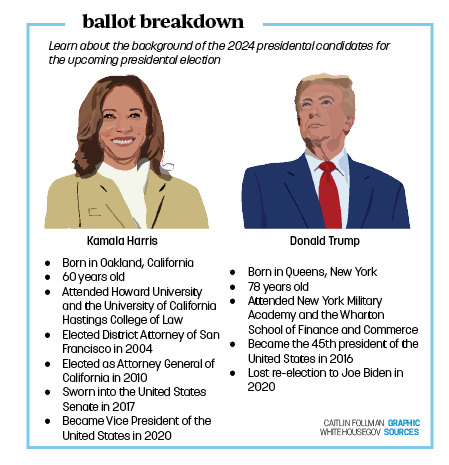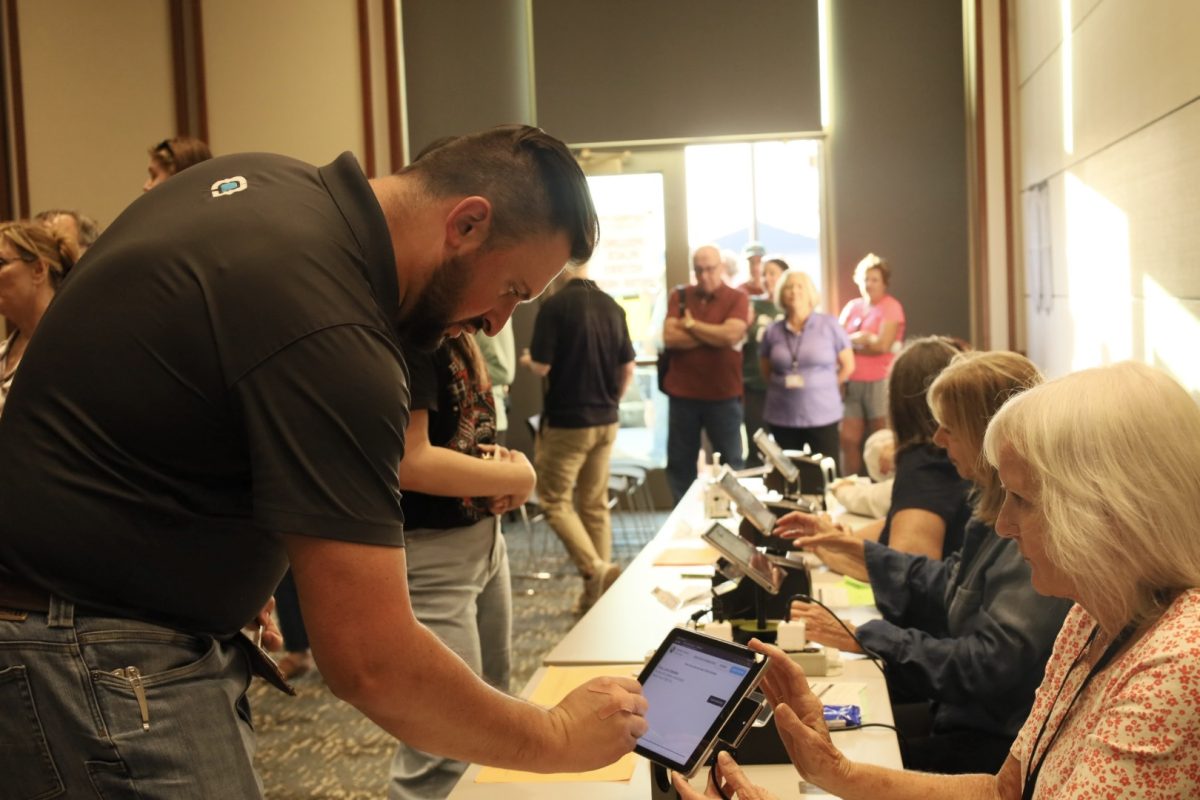The U.S. presidential election took place on Nov. 5. In the end, former President Donald Trump ended up winning the election by a supermajority. The Senate and House of Representatives are also both a Republican majority. But beyond the results, this election brought to light the clear partisan divide that is having a serious impact on the social and political state of America.
Senior Grace Nie said she’s seen that impact here.
“It’s very polarized. Whenever you see the news, it’s typically one side villainizing the other and vice versa. This gridlock is seen in all three branches of government,” Nie said. “Passing legislation through Congress has become increasingly slow and challenging, appointing federal judges has also become a grueling process, and opinions around the President feels consistently very black and white.”
Social studies teacher James Ziegler said he agreed with Nie.
“The political climate is obviously a little bit stress-inducing and anxiety-inducing for me. Just the level of political division in this country is something we haven’t seen in my lifetime,” Ziegler said. “For me, it’s definitely worrisome and our democracy and democratic institutions are on shaky ground and that poses a little bit of a concern to me.”
Junior Sophia Tahir said she was happy to see a woman run for President but was worried about the current political division in the social climate.
“I’m happy (to have seen) a woman running for top office and seeing more inclusion within the candidates. The political atmosphere seems to be quite divided and I think we are all hoping to have a peaceful transition after the election,” Tahir said. “(The country) has been polarized for quite a while and there doesn’t seem to be much change now. Though perhaps it will change in the future.”
Tahir also said abortion was one of the issues she was concerned about regarding the election.
“I’m concerned about women’s bodily autonomy and their right to choose for themselves,” Tahir said. “I’m also hoping the war in the Middle East will reach a resolution soon with equitable results for all parties involved.”
Nie said she was worried about gun policy and control.
“For me, the issue I’m most concerned about is probably gun policy. Unfortunately, America has a serious issue with gun violence, especially in schools,” Nie said. “As a student, I hope to see more done to regulate these weapons so that children can worry about their education and not the threat of being shot and parents can feel comfortable with their kids attending school without worrying about their safety.”

In regard to how this election will influence the following ones, Tahir said a smooth transition of power will be necessary to keep politics civil.
“A lot of this depends on election results as well as a smooth transition of power for the winning candidate. If all goes well there will be more empowerment for the population,” Tahir said. “If the results are contested there could be much civil unrest and a plethora of court cases.”
Tahir said the youth vote will be an interesting addition to this election.
“The youth, while previously less involved, seemed to be more interested in the election this year.”
Ziegler said younger generations tend to be more liberal and focus on social issues, but they show out to polls less.
“Just being general, as far as Gen Z goes-they do tend to lean more liberal. That’s mostly based on social issues like LGBTQ+ rights and expanded civil rights for POC. Another issue is climate change and addressing global warming and the like. The thing about that though, is that younger voters don’t tend to turnout,” Ziegler said. “In the USA, in terms of voting demographics, 18-29 year olds have t3he lowest voter turnout of any group. Some of the groups that have the highest voter turnout are aged 60 and older. So the youth influence on this election depends on if they registered and if they are motivated enough to show up to the polls to vote. Although they lean left, what really matters is if they show up and vote.”
Overall, Tahir said there are reforms needed to be made to reduce the political divide in the country.
“Better communication would definitely be helpful,” she said. “Improvements in fair journalism could also improve the current climate.”
Nie said people being more bipartisan and willing to listen to each other will help the partisan divide.
“A general increase in willingness to compromise and concede would help with the polarization plaguing our country,” Nie said. “If politicians and the public weren’t so focused on bringing down the opposing side and rather focused on the common goal of bettering the country, I think we would all be a little better off.”































![What happened to theater etiquette? [opinion]](https://hilite.org/wp-content/uploads/2025/04/Entertainment-Perspective-Cover-1200x471.jpg)














































![Review: “The Immortal Soul Salvage Yard:” A criminally underrated poetry collection [MUSE]](https://hilite.org/wp-content/uploads/2025/03/71cju6TvqmL._AC_UF10001000_QL80_.jpg)
![Review: "Dog Man" is Unapologetically Chaotic [MUSE]](https://hilite.org/wp-content/uploads/2025/03/dogman-1200x700.jpg)
![Review: "Ne Zha 2": The WeChat family reunion I didn’t know I needed [MUSE]](https://hilite.org/wp-content/uploads/2025/03/unnamed-4.png)
![Review in Print: Maripaz Villar brings a delightfully unique style to the world of WEBTOON [MUSE]](https://hilite.org/wp-content/uploads/2023/12/maripazcover-1200x960.jpg)
![Review: “The Sword of Kaigen” is a masterpiece [MUSE]](https://hilite.org/wp-content/uploads/2023/11/Screenshot-2023-11-26-201051.png)
![Review: Gateron Oil Kings, great linear switches, okay price [MUSE]](https://hilite.org/wp-content/uploads/2023/11/Screenshot-2023-11-26-200553.png)
![Review: “A Haunting in Venice” is a significant improvement from other Agatha Christie adaptations [MUSE]](https://hilite.org/wp-content/uploads/2023/11/e7ee2938a6d422669771bce6d8088521.jpg)
![Review: A Thanksgiving story from elementary school, still just as interesting [MUSE]](https://hilite.org/wp-content/uploads/2023/11/Screenshot-2023-11-26-195514-987x1200.png)
![Review: "When I Fly Towards You", cute, uplifting youth drama [MUSE]](https://hilite.org/wp-content/uploads/2023/09/When-I-Fly-Towards-You-Chinese-drama.png)
![Postcards from Muse: Hawaii Travel Diary [MUSE]](https://hilite.org/wp-content/uploads/2023/09/My-project-1-1200x1200.jpg)
![Review: "Ladybug & Cat Noir: The Movie," departure from original show [MUSE]](https://hilite.org/wp-content/uploads/2023/09/Ladybug__Cat_Noir_-_The_Movie_poster.jpg)
![Review in Print: "Hidden Love" is the cute, uplifting drama everyone needs [MUSE]](https://hilite.org/wp-content/uploads/2023/09/hiddenlovecover-e1693597208225-1030x1200.png)
![Review in Print: "Heartstopper" is the heartwarming queer romance we all need [MUSE]](https://hilite.org/wp-content/uploads/2023/08/museheartstoppercover-1200x654.png)



